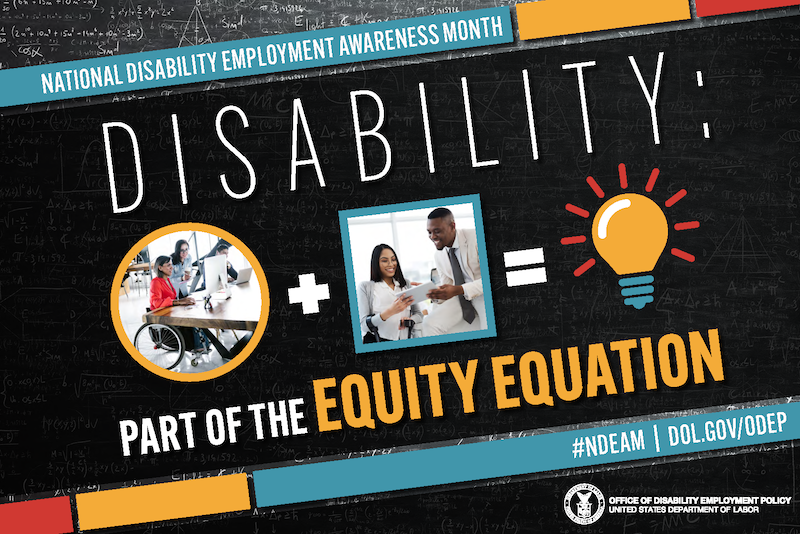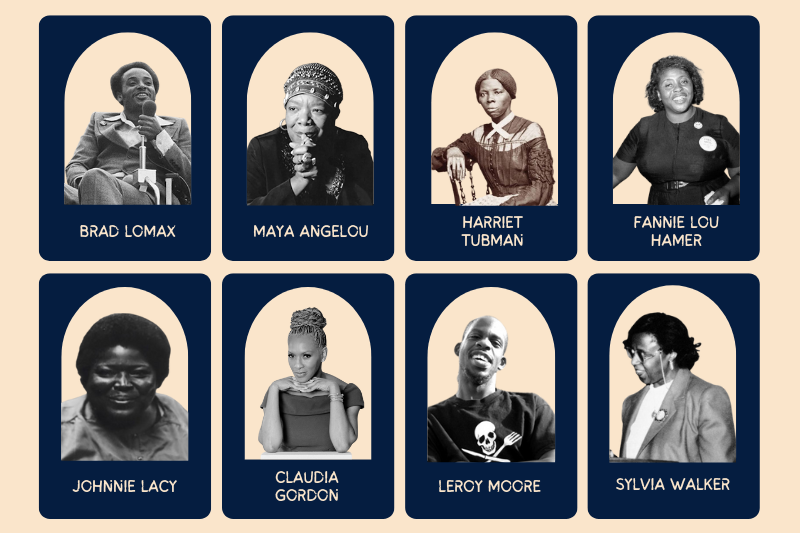People with disabilities want and deserve jobs just as much as anyone else. And employers benefit from hiring people with disabilities. This all seems pretty obvious, but since there is a whole month devoted to it we’re going to talk about the importance of disability employment awareness.
The U.S. Department of Labor announced that, “in recognition of the vital role people with disabilities play in making the nation’s workforce diverse and inclusive, ‘Disability: Part of the Equity Equation’ has been chosen as the theme for October’s National Disability Employment Awareness Month 2022.”
“A strong workforce is the sum of many parts, and disability has always been a key part of the equation,” said Assistant Secretary for Disability Employment Policy Taryn M. Williams in the department’s press release. “People with disabilities make up a wonderfully multifaceted group. By recognizing the full complexion of our community, we can ensure our efforts to achieve disability inclusion are, in fact, truly inclusive.”
While this all makes sense, unfortunately, we’re not there yet. The August 2022 Bureau of Labor Statistics (BLS) show these Disability Employment Statistics for ages 16 years and over:
Labor Force Participation Rate
- People with disabilities: 22.5%
- People without disabilities: 68.%
Unemployment Rate
- People with disabilities: 7.7%
- People without disabilities: 3.6%
Better For Employees
NNCIL’s Rural Independent Living Advocate Deb Maijala, also teaches skills necessary for identifying and landing the jobs our clients are looking for. She says there are many reasons why it’s important for people with disabilities to find appropriate employment.
“People feel empowered when they have the right to choose where they work,” she says. “And people with disabilities aren’t any different from anyone else.”
Maijala says that in a competitive job market, people with disabilities will start at the bottom and work their way up like anyone else, and she’s here to give them the tools they might need to do that.
Depending on where the NNCIL consumer is in their journey, Maijala will often start by teaching them how to network.
“They need to identify what it is they want to do and then tell people what they’re looking for,” she says. “I teach them how to better advocate for themselves.”
NNCIL’s employment program also offers assistance in these areas:
- How to research a company – to decide if you want to apply and to be better prepared to interview
- How to prepare and upload an online application and/or resume
- How to ace an interview – on Zoom or in-person
- How to network
- When and how to tell a potential employer about a disability
- How to follow up on interviews
Better For Employers
People with disabilities are only half of this equation though. Sometimes employers need to be educated on why this is of value for them as well.
“It’s not about sensitivity training,” Maijala says. “It’s about getting them to understand and see clearly the value in hiring people with disabilities.”
Maijala says people with disabilities care, they’re loyal and they do the best job they can.
“Maybe they need a little coaching from time to time, but that coaching goes away as they learn new skills,” she says. “And it’s definitely worth it for both sides.”
In The economic argument for hiring people with disabilities, Nature.com identifies some of the disadvantage for employers not hiring people with disabilities: “Three key issues are missing out on employing individuals that are highly skilled, losing employees that could provide alternative approaches to problem-solving, and not being able to properly target customers with disabilities.”
They expand on issue #2, “People with disabilities are often more likely to find appropriate solutions to complex and unexpected problems. This is because they are coping with sometimes difficult personal situations in environments that are not always meant to accommodate their specific requirements.”
Read the rest of the article here
While there are many advantages to employers of people with disabilities in the workplace, there are also tax benefits that can help their bottom line.
Bringing it all together
Vocational Rehabilitation Nevada works with employers and employees to create a better chance of success for everyone.
The Rehabilitation Division is comprised of three bureaus, which include Vocational Rehabilitation, Services to the Blind and Visually Impaired, and the Bureau of Disability Adjudication. The Division also includes the Blind Business Enterprises of Nevada Program, and the Office of Disability Employment Policy.
They work with people with disabilities on an individual basis, providing counseling and guidance, training, job placement and services to support job retention.
At the same time, they’re working with employers to identify recruitment requirements and then refer pre-screened, qualified candidates that match those requirements. As they share: “Our assistance to your business includes work readiness skills development, customized on-the-job training strategies, guidance and technical assistance, and assessments of assistive technology needs. We provide quality support throughout the recruiting process, and comprehensive follow-up services.”
What does this all mean? They’re committed to ensuring success for both the employer and the employee so they’ll provide the services necessary for that to happen.
We’re here for you
If you or someone you know is interested in entering the workforce or looking for a new job, reach out to Maijala at 775-383-7603 to get started. She can then refer to the appropriate agencies to further the process.
“People need to learn how to advocate for themselves,” Maijala says. “They need to not get bogged down with the what-ifs and to be true to themselves.”



